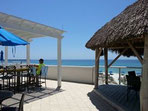
This post contains affiliate links, meaning Beachside Community Acupuncture PLLC may receive a small commission for purchases made through certain links at no additional cost to you. (In other words, you support us in a small way when you buy the products that we highly recommend and would use ourselves!) Click here to view our full disclosure policy.
What comes to mind when you hear the word "herbs"? If you're a chef, you'll probably envision leafy plants that you use to prepare fragrant dishes. If you're a patient of a naturopath, you may simply picture a supplement bottle. Herbs come in all shapes and sizes and can be used in a variety of ways, which makes it easy to incorporate them into your health routine. In this blog post, we'll cover some basic ways to obtain and use herbs so that you can choose options that work best for your lifestyle.
Herbs in the Kitchen
Wary of herbal products and how they may react with medications? Simply use herbs in your cooking to reap their benefits at less concentrated dosages. Almost any dish can be livened up with fresh or dried herbs, making healthy food tastier to eat!
While you can always buy culinary herbs at any grocery store, you may get more medicinal value from them if you consider other sources...
- Grow your own. Having plants around improves health, and cultivating your own herbs leads to less environmental waste as there's no packaging involved. Many herbs can be grown in small pots inside - use mosquito bit tea and sticky traps to manage gnats - and from there you can use them fresh or consider drying them yourself. (We love this guide on the Homestead and Chill blog.)
- Wildcraft. Gathering herbs from nature can save money and effort - who doesn't have dandelions all over their yard just waiting to be uprooted? - but requires a lot of knowledge before it can be done safely. Before picking any herbs from the wild, you must be sure that they haven't been treated with synthetic fertilizers or pesticides. Even more serious than that, you must be absolutely certain of the herb's species. To paraphrase Samuel Thayer in his foraging book Nature's Garden: If you tried to buy bananas at the market but they rang up as grapes, you would argue with the cashier that they were bananas, and if the manager was called over to explain to you that they were grapes, you would still argue that they were bananas because you know without a doubt the difference between a banana and a grape.
- Purchase from specialty stores. For dried herbs, buying whole and grinding them yourself will give you the best results. At the very least, buy powders that are organic and were packaged recently whenever possible to avoid toxic fillers and reap the most health benefits. Spice stores often have a wide variety of options, and you may also find more potent herbs at international markets. If all else fails, you can order what you want online.

Herbal Products
Another way to bring herbs into your day-to-day life is by using premade products like salves, lotions, lip balms, and massage oils. Always read labels to make sure that real herbs or essential oils are used - the word "fragrance" means chemicals! - or better yet, make your own products with essential oils (distilled plants) or materials purchased from a reputable company like Mountain Rose Herbs.
You may also want to buy premade products to take orally, such as an herbal supplement. In Traditional Chinese Medicine, single herbs and herbal formulas can be found as decoctions, liquids, granules, tablets, capsules, and tea pills. (Herbal tea could also be included in this, as steeping dried herbs in hot water is very similar to making a decoction.) While cooking with herbs comes with limited risk, taking concentrated forms of herbs as supplements should usually be overseen by a healthcare professional, especially if you're on any medications.
We hope this post inspires you to incorporate more herbs into your routine. Just like eating plants, the more variety you can get, the better! As always, though, check with your doctor before making any drastic changes, and always stop using or taking anything that causes an adverse reaction.

Kathleen Ketola is a Licensed Acupuncturist and the owner of Beachside Community Acupuncture. She loves providing affordable acupuncture to the residents of McKinney, Texas, and surrounding cities like Prosper, Frisco, and Plano, but she also enjoys educating the general public on how acupuncture and Traditional Chinese Medicine (TCM) can treat everything from pain to infertility to stress and beyond. Click "Book Now" at the top of this page to book an appointment or feel free to contact her at (214) 417-2260.









